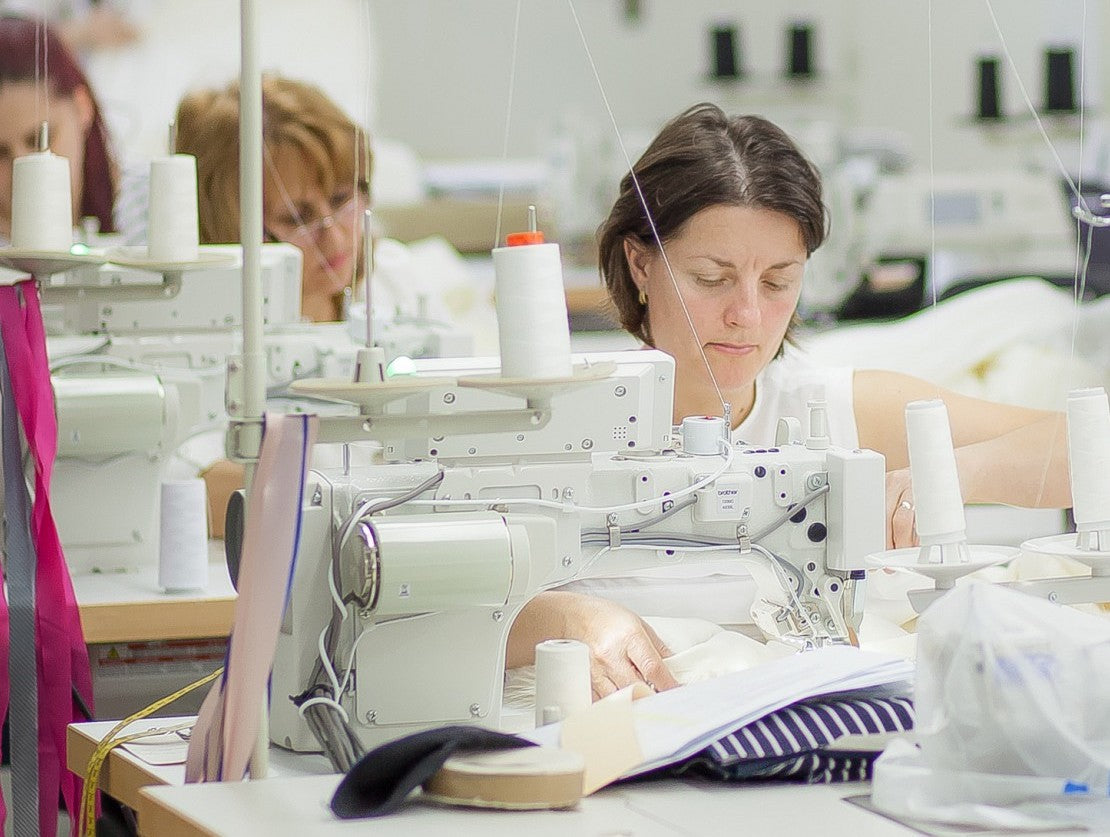When I started Saywood, it was really important to me to find ethical manufacturers that were doing good, and had a pathway planned out to continue to adapt to what has become not just the right thing to do, but a necessity, in a fast changing world. It is clear that we absolutely must do more to ensure that what we create is not causing harm to the environment and the people. And Mantra, our factory in Romania, are well on the path of a better way of doing business and production.
Mantra are shifting their production to focus more on smaller brands. They are open to working with smaller quantities, focused on high quality production. They are actively changing the things we as consumers may not even realise are vital to the production processes; the thread, the fusibles and interfacings, the linings. Not to mention their active promotion of using hangers from ocean plastics, and innovative waste management to get factory floor offcuts put to good use.
I spoke to Tom, the founder of Mantra, to find out more about what is behind their story. And their story really shows this is a business built by those that care.
You founded Mantra in 2003. What made you want to start the garment manufacturing business?
My journey into apparel is long and convoluted. My sister (Boston MA, USA based paediatrician) was part of a relief project to improve medical outcomes in post revolutionary 1990’s Romania. I tagged along as a supporter to assist with delivery of medicines to the main children's hospital in Bucharest. Really, as a recent University grad, I was looking for an excuse to backpack across Eastern Europe.
I got tied up with a local, with whom I started exporting clothing to the USA. It was something I had planned to last a season, not a lifetime. But eventually, I found myself working for a well known US brand giant - think 90s branded hoodies, the ones every kid was after! - as the head of their Bucharest based Regional Sourcing office reporting to London. It was great training in the apparel business, and a true life lesson. One day a colleague from London called and suggested I get on a plane the next day to London... to get fired.
I walked into a nearly empty office. “Where is Claude (my boss)” I asked? “Oh, he got axed yesterday” was the reply. I met the head of International Sourcing and the conversation went something like this:
VP of sourcing: “Who are you.”
Me: “I’m Tom”
VP “ What do you do?”
Me: “I’m running the regional sourcing office in Bucharest for Romania, Bulgaria and Hungary.”
VP: “ What was the total FOB value of last year's exports?”
Me: “7 million dollars”
VP: “Is it going to be 50 million this year?”
Me: “No”
VP: “100 the year after?”
Me: “No”
VP: “Well then you’re fired.”
After getting that out of the way he tried to soften the blow.... “Look, I buy 3 billion dollars of clothing around the world and I cannot have an office in every country that makes a few million. [Cue everyone else thinking, a few million everywhere adds up mate!] There are reporting requirements for us corporations that make it impossible, aside from the massive cost of running so many independent offices...”
Me: “And what do I do with all the staff?!”
VP: “Just what I have done to you, you fire them.”
That nearly killed me. I was out on a limb. Living in Romania, staff to pay, people disappointed, no real idea of what to do next...
But as it turned out, there were a lot of people looking for someone on the ground in Romania at the beginning of the internet-driven massive offshoring of production from western to eastern Europe. It also gave me the experience of failing and rebounding, the greatest quality of a true entrepreneur. I eventually partnered with a Portuguese fabric mill to build them a garment factory, and with the staff of my [famous 90s hoodie brand] sourcing office we found a slew of new clients to continue doing production management and quality control. That office eventually became Mantra, a fully factored manufacturer and supplier.

You are doing a lot of work to become more and more sustainable as a manufacturer. How have you found this journey? What have been the most important things for you to change?
These are the 3 key initiatives we are working on:
- We are trying to implement a recycled only policy (or best in class as for example, fusings which have woven and non-woven components, plus glues, are not widely available, something more the 70/30 recycled non recycled split). For plastic based trimming and packaging to be made from recycled, and also included in this initiative, other sustainable options, such as non old-growth sourced pulp for viscose, etc.
*Non old-growth sourced pulp refers to the forestry and wood that the pulp to make viscose comes from. Old growth forests are those that have been established for thousands of years, and are habitats to wild animals. So Mantra ensures that any viscose or cellulose materials they use have not been made from fibres that come from old growth forests, where deforestation can cause devastation to wildlife and nature. Instead they source those which come from sustainable forestry sources, vital to keeping our natural habitats safe and intact.
- We want to make a switch to renewable energy. Romania liberalised its energy market this year and we can now buy secure green energy, but we are waiting on an EU grant to place photovoltaic panels on our building to generate 100% of our needs by solar power. If our application is rejected, we will look at changing to a green energy supplier this year where we can purchase energy from hydro power securely.
- We are trying to support new brands, small brands, and our own label that uses all left over dead stock we have from our main production, and mill dead stock only - growth from eliminating waste.
These are the main three areas we’ve identified of Mantra’s carbon footprint, and the ones we have more or less control over in the final product carbon cost. There are smaller issues like combining shipments between clients to make sure we fill trucks. But like this example, mostly they are just good business practices.

Fabrics piled up ready for cutting at Mantra
What has been the biggest challenge to change from the manufacturing perspective?
The process of identifying the initiative points has been easy. Getting clients to share cost has been impossible. Waiting for an EU decision on the solar power initiative 12 months and counting has been dispiriting. Working on dead stock collection has been a kind of a two steps forward one step back, as we try to match product opportunities to actual fabric on the shop floor… it’s not always straightforward for clients to utilise the materials we have available; design and function can be a barrier.
Tell us about your zero waste initiative and your ambition to become carbon neutral?
Factory floor waste is challenging. A lot of ‘recyclers’ are not recycling the waste, but instead burning it. It is difficult to find the ones that are doing it correctly. So instead we give it to someone who makes padding. But we are always on the lookout for more options to ensure the floor waste goes to reuse.



Maker labelling up the size panels for each of the garments, so these can be sorted and grouped for the production line
You frequently update and regenerate your factory environment and are a socially responsible manufacturer. What does this mean to you?
We want to create an environment that reflects our values. Our main value is we like creating beautiful things. And we do this in a team, with a hierarchy, but an emphasis on inclusion in the process. So the space is to be comfortable, the management style is open, flexible and communicative. We are a small team with a sense of community. You can really see that everyone wants the best outcome, a true collective effort. As for socially responsible, we are just following the law really, and doing what we think is honestly how we would like things. For us, it is not about squeezing out profits, but looking at staying relevant for the long haul, with a skilled team servicing an ever more complex market.

What is next for Mantra’s journey as a responsible manufacturer?
Much like your Saywood project, we have determined that we want to work on smaller projects, with owner-operated businesses where we can bring a huge amount of fulfilment support, and thus maximise our labour value input to the product. We are working on developing a wider range of manufacturing skills, to help balance the range of products and thus the seasonality of our business. We are moving away from corporate fashion businesses, as we feel that their business model based on storefronts, season to season newness and trend is dead, and do not share our values. We are looking at focused businesses that share our ideals, as we feel that they can make a real impact on sustainability as they have much shorter decision making chains.
As a business, it is important to make responsible choices; from the fabrics we use, to the people we collaborate with. We want to work with those that are genuine and are wanting to do the right thing for both people and planet. Mantra is definitely doing just that. And Tom and his team are making significant headway. To date, they have eliminated nearly 4 metric tonnes of new polyester from being produced with their switch to recycled. The goal for 2021 is for all linings, labels and packaging to be made from recycled polyester or bio-based materials. And we are excited for their switch to solar energy, generated from their own photovoltaic plant - we are wishing them every success with the EU grant.
This is what makes a great business; a business that cares. And we are proud to be making our clothes with Mantra, working towards a better future.



